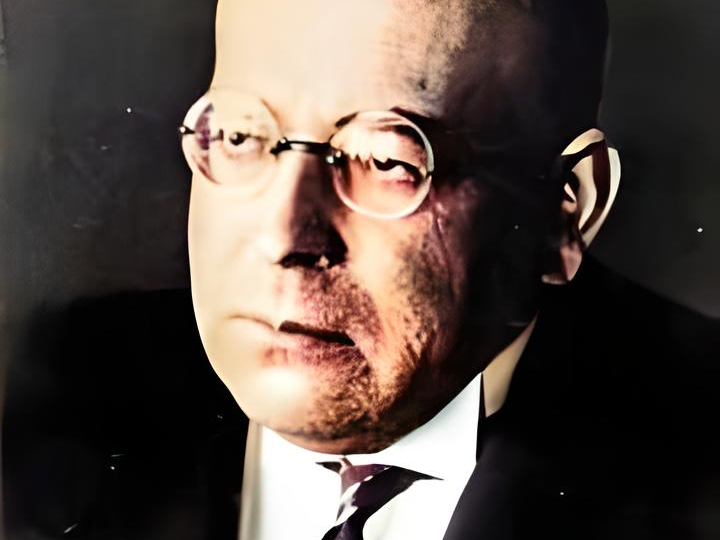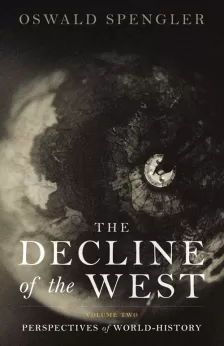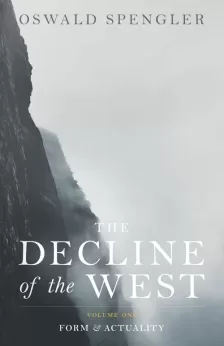This article appeared first in Criticón no. 60-61, October 1980. This issue was entirely devoted to the German question. Mohler was also celebrating the tenth anniversary of the magazine and wanted to focus his reflections on national history. It was later republished in French in the Belgian Francophone New Right journal Orientations n°1, 1982 by Robert Steuckers. This English translation was done by Yaro Deli on the basis of the French text published in Orientations. Slight adaptations were made for clarity.
There are many ways to ignore the thoughts of great men and live as if those thoughts had never been uttered. In 1980, this is what any observer could see in the Federal Republic of Germany. It was the centenary of Oswald Spengler’s birth. Even in the tributes paid to the philosopher, we must objectively note shortcomings. Some have stressed the importance of Spengler’s philosophy of history, whose prophecies have been confirmed by events, but, in doing so, they have avoided addressing the political assertions of the author of The Decline of the West. Others wanted to “save” the politician Spengler, making him an anti-fascist and studying only very superficially the links that existed between Spengler, Hitler and National Socialism. I say nothing of the “brilliant” essayists who have worked prodigiously hard to study Spengler in order to get very little out of him.
The Total Spengler
It was another great man, Herbert Cysarz (born 16 years after Spengler), who was able to truly grasp Spengler’s work in its entirety. His tribute to him in the January 1980 issue of the magazine Aula, published in Graz, Austria, begins with these words:
No contemporary historian has known such great fame as Oswald Spengler. None was so unquestionably original during his lifetime. This man, hostile to all literature and all idealism, totally alien to the abstract world of books, gave a glimpse of the great themes and the multiple interweavings of history and emphasized, as had never been done before, the intensity that resides in will and action. He gave the world a new way of conceiving politics, as well as a particular style of seeing, thinking and presenting history.
Of course, Cysarz knows that Spengler is more than a historian. Of his work, he writes that it remains a sign of the destiny that manifested itself at the turn of our time.
A man of the same generation as Cysarz, Ernst Jünger had already written things of this kind in the 1920s, even if the tone was more measured, less pathetic. In a very important political article of the time (which, of course, is not to be republished in Jünger’s complete works), he expressed an opinion shared by many contemporaries: for a brain of Spengler’s caliber, they would make a whole parliament.
The Weaknesses of Spengler’s Work
Such enthusiastic acceptance of Spengler’s work as a whole does not, however, mean endorsing all its details without criticism. Spengler is not a superman. He, too, has his weaknesses. Alongside the prophecies that have actually come true, there are those that have not been followed up. Spengler’s in-depth studies of the various cultures of history compel us to note that not all areas of man’s creative activity are equally familiar to him. For example, Spengler’s literary style does not always live up to his subjects. This is not surprising as these texts arouse emotions that are too strong. Spengler’s enemies like to quote sentences in which a certain “kitsch” shines through. Moreover, Spengler, like many visionaries, has a weakness: what is immediate. Thus, according to him, the great poet of his generation is neither Stefan George nor Rainer Maria Rilke, but Ernst Droem, who has rightly remained unknown.
The reaction of the author of The Decline of the West to receiving a significant book of our century from a young writer is very revealing. In 1932, Ernst Jünger had his book entitled Der Arbeiter (The Worker) sent to Spengler with all his respects. Spengler merely leafed through the book and wrote:
In Germany, the peasantry is still a political force. And when one contrasts the supposedly moribund peasantry with the ‘Worker,’ i.e., the factory worker, one distances oneself from reality and denies oneself any influence on the future.
Since Spengler did not read the book, he could not have known that Jünger was not talking about the factory worker. But it is astonishing that Spengler overestimated the political potential of a peasantry which, a few years later, was to be completely annihilated.
The Inner Dam
Neither these few blindnesses nor the bizarre aspects of Spengler’s life should distract our attention from his work as a whole. This sensitive man put on a mask and adopted a style that should not be taken at face value. Thus, Spengler’s admirers will avoid confusing his true personality with the “Caesarean mask” he displayed during his many public appearances.1
Spengler’s detractors, on the other hand, will try not to portray him, in the light of his private life, as a sort of bizarre totem of the declining bourgeoisie.
Of course, Spengler’s reclusive life allows for such assumptions. He was born on 29 May 1880, the son of a high-ranking postal official, in Blankenburg in the Harz Mountains.2 It was not the father, a peaceful man, who dominated family life but the mother, a half-mad creature, devoured by pseudo-artistic ambitions. She filled their large apartment with so much furniture that young Oswald and his three sisters had to lodge in storage rooms under the roof!
After defending a dissertation on Heraclitus, Spengler became a teacher of mathematics and natural sciences at a grammar school (Gymnasium). The death of his mother did not leave him a substantial inheritance but still enabled him to live without working. From 1911 until his fatal heart attack on 7 May 1936, he lived in seclusion as an independent researcher in Munich, in a huge apartment in the Gründerzeit style (the style of the 1870s and 1880s), crammed with massive furniture and located in Widenmayerstraße. One of his sisters was treating him.
He traveled little and maintained only a small circle of acquaintances. He turned down the professorships he was offered. The First World War had changed him. His life seemed to be dominated by a fierce refusal of all human contact. Nothing is known about possible erotic relations. From the outset, there was a retreat into interiority. And only Spengler was interested in the result produced by this isolation from 1917 onwards. The chastity of this existence is by no means an argument against Spengler’s work. Nor can isolation in a monastic cell be an argument against Augustine.
Beyond Optimism and Pessimism
In the history of ideas, the significance of Spengler’s work lies in the fact that, in a situation of crisis, he brought back to consciousness the “underground” foundations of thought with a vigor reminiscent of that of Georges Sorel. But what was this crisis situation? The collapse, because of the First World War, of the German Reich, which for centuries had been the center of Europe. And what are these “underground” foundations? This is the resolutely realistic thought initiated by Heraclitus and the School of the Portico (Stoa). It is a way of thinking that has always renounced the false consolations and mirages of systems based on pseudo-cosmic orders. In a masterful way, Spengler confronted the war generation with this thought. His style was a curious mixture of classical “monumentality” and expressionism, made up of garish colors. And it was precisely those who had most profoundly experienced the collapse of the bourgeois world (that of the “Doll’s House”3) who heard his call.
This thinking goes beyond optimism and pessimism. The title the publisher chose for Spengler’s major work (The Decline of the West) was misleading. It is possible that, in private, Spengler lamented the collapse of a world that was dear to him. But his work deplores nothing; rather, it teaches us that history is a single movement of emergence and decline and that there is nothing left for man but to face this reality with composure in the place that fate has designated for him. This is what prevented Spengler from identifying with the Third Reich and led him, in 1933, in his last book, Jahre der Entscheidung (Years of Decision), to reproach the NSDAP (National Socialist German Workers’ Party) for its blindness in foreign policy. For Spengler, foreign policy, because it is a struggle, is paramount to domestic policy, which in turn places greater emphasis on welfare. Thus, the hybrid character of National Socialism becomes clear: as socialism it has a strong tendency towards utopia, even if it also knows the fascination of the Heraclitean melody.
Of course, no political praxis is possible without a certain dose of hope and without allusions to a (cosmic) order endowed with (teleological) meaning. Only a minority of individuals support the Gorgon’s gaze. In this minority, the percentage of men of action is higher than that of intellectuals, priests, and other opinion-makers. In any case, the followers of Heraclitus have their own consolation, which they derive precisely from that which constitutes a source of terror for others. Reading Spengler shows us the twofold aspect of Heraclitean thought.
Inflexibility
Herbert Cysarz has aptly quoted the two sentences which most implacably show what separates Oswald Spengler both from liberal society and from any kind of dictatorship of welfare (whether red or brown4). The first of these sentences says: “Facts are more important than truths.” The second: “Life is not holy.” This is the harsh side of Spengler’s philosophy, and it is in Man and Technics (1931), a book stripped of all ambiguity, that Spengler particularly emphasizes it, in defiance of all the chatter of our century.
Heinz Friedrich, in his article in Die Welt, written for the philosopher’s centenary, was even more concise. It starts from the fact that Spengler declared himself a disciple of Goethe and Nietzsche. Cysarz, on the other hand, said that Spengler’s notion of destiny revealed more elective affinities with the Germanic sagas and the tragic heroism of Shakespeare than with classical humanism. Heinz Friedrich writes, in language that has nothing to do with anything Spenglerian (he speaks of “truths”!):
At the end of this century of chaos, citizens must get used not only to learning about the truths but also living them and living with them. As Goethe said, it is not only Nature that is insensitive, there is also history because, to paraphrase Spengler, it can be said that it has more natural characteristics than we are willing to admit. As a result, it ignores our hopes and fears with indifference.
For Heinz Friedrich, what is Nietzschean in this is the diagnosis that posits decadence as a vital weakness:
The agent of life, the factor favoring eternal becoming, is, for Nietzsche, the will to power.
Friedrich adds a warning:
The will to power, recognized by Nietzsche as a vital principle, is quite different from the biological and muscular pride that is meant by it even today.
This vulgar conception of things is shared by Nietzsche’s followers as well as his opponents. It simply means that all life has the impulse to assert itself. Spengler is more than a disciple of Nietzsche; he completes and transforms him. Spengler’s personal contribution to this school of thought is that he realizes something which he found in Nietzsche in the form of a call.
The Colors of Life
He who resists the Gorgon’s gaze is not turned away from the world. On the contrary, he sees the world in a more intense, more concrete, more colorful way. This is the paradoxical reality. The gaze of hopes, on the other hand, wants to see only coherences and laws, and thus diverts attention from the particular to lose itself in the general — it disenchants the world.
One must realize how much the dominant Weltanschauungen (worldviews), which are a poor mixture of the bland ideology of the Enlightenment and secularized Christianity, have, for the average man, transformed the world into a set of sad patterns. It is the result of a well-defined vision of history (in history, man deciphers the world in order to understand it). In this view, where does life derive its value? From something that will be achieved in the distant future after a long evolution and after our death. Nothing is itself; everything exists only when it signifies something else, which is “behind” it.
Life is then reduced to an average rationality, which forbids all those great effervescences that lead either upwards or downwards. Man then moves within a narrow framework, which offers him nothing more than the satisfaction of his physical needs. Above this frame, a lukewarm current of behaviorist ethics drifts. Arnold Gehlen called this “mass Eudaimonism.” The masses are made up of isolated individuals, who are not rooted in anything solid, who are not inserted into any concrete structure, who wander aimlessly in the “general.”
It is in front of such a background that the Spenglerian cyclone must be understood: it breaks the monotony of what claims to be called “modern” and injects vibrant tones back into the world. In Spengler’s vision, man no longer embodies any “generality” that he shares with all his fellow human beings. On the contrary, he belongs to a specific culture, which cannot be reduced to anything else but has its own meaning. Every culture is totally cultic in nature because, in everything it produces, there is a particular symbol with which it identifies itself and by which it is distinguished. Spengler sees these cultures as plants live, with their phases of growth and decomposition. Each of these growth phases occupies its own rank. What a powerful melody resonates in its evocation of the end of a culture or of Caesarism! Whole pages from the first volume of The Decline could be quoted with pleasure:
A real life is being led. It is not determined by the intellect. Truths lie beyond history and life. … The peoples of culture are forms springing from the river of existence. … To me, the people (Volk) are a unity of soul (Seele). … The gaze frees us from the limits of enlightenment. … What gives value to a singular fact is simply the great or weak power of its formal language, the force of its symbols. Beyond good and evil, superior and inferior, necessary and ideal.
One last word must be added about the German Oswald Spengler. He did not evoke the plurality of cultures in order to sublimate himself in exoticism. He wrote his books for the Germans who were experiencing the collapse of the Reich. Spengler does not drag the Germans before some tribunal of the “generality” but confronts them with their specificity in the mirror of their history. In all of Spengler’s writings, one senses his conviction that the Germans played a special role in the past and that the Prussians will play one in the future. Spengler’s beliefs obviously disturb all those who want to maintain the frustrated mentality that prevails today.
About the Author
Armin Mohler is the author of the major work Die Konservative Revolution in Deutschland (The Conservative Revolution in Germany) 1918-1932 (1972). He was the secretary of the writer Ernst Jünger and correspondent for several German and German-language Swiss newspapers in Paris. Born in Basel, Switzerland, in 1920, he moved to Munich, Germany, in 1961, where he died on 4 July 2003.
Footnotes
We can, of course, discuss the good taste of publishing Spengler’s deathbed photo. This photograph proves, however, that this mask did not permeate Spengler’s physiognomy in a lasting way.
Another protagonist of the Conservative Revolution, who came from this city, was August Winnig. He was born two years before Spengler, in 1878, and was the son of a gravedigger.
Puppenspiel, the word used by Armin Mohler, means “puppet theater.” We translated it as “Doll’s House,” referring to Ibsen’s play. This Norwegian author never got tired of criticizing the bourgeois world. And to say that the bourgeois world is a “Doll’s House” underlines its concern to escape the vicissitudes of the world and of history. (original note by Robert Steuckers)
In Germany, the color red in politics is attributed to parties of Marxist, Communist or Social Democratic inspiration. The color brown to the National Socialists. The color black to denominational parties. It symbolizes the cassock of priests. Today, a new political color has been born: the green of the ecologists. The blue is attributed to the liberals. (original note by Robert Steuckers)









